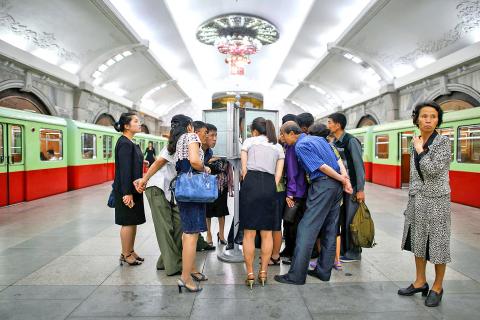A day after their historic summit, US President Donald Trump and North Korean leader Kim Jong-un returned to their respective strongholds, but to far different receptions.
In Pyongyang, Kim woke up yesterday morning to state media’s enthusiastic claims of a victorious meeting with the US president; photographs of him standing side-by-side with Trump on the world stage were splashed across newspapers.
Meanwhile, Trump faced questions about whether he gave away too much in return for far too little when he bestowed a new legitimacy on Kim’s rule and agreed, at Pyongyang’s request, to end war games with Seoul.

Photo: AFP
As US Secretary of State Mike Pompeo jetted to South Korea for follow-up talks, much of Asia was still trying to process the whirlwind events of the day before.
There were worries, especially in Tokyo and Seoul, about Trump agreeing to halt US military exercises with South Korea.
That concession appeared to catch the Pentagon and officials in Seoul off guard, and some South Koreans were alarmed.
Pompeo yesterday left Singapore on his way to Seoul, where he planned to meet privately in the evening with General Vincent Brooks, commander of US Forces Korea, and is to meet South Korean President Moon Jae-in this morning to discuss the summit.
Japanese Minister of Foreign Affairs Taro Kono is also heading to Seoul and is due to meet with Pompeo and his South Korean counterpart.
Pompeo then plans to fly to Beijing to update the Chinese government on the talks.
Trump on Twitter said that meeting meant “the World has taken a big step back from potential Nuclear catastrophe!”
“No more rocket launches, nuclear testing or research! The hostages are back home with their families. Thank you to Chairman Kim, our day together was historic!” he added.
Trump insisted that strong verification of denuclearization would be included in a final agreement, saying it was a detail his team would begin sorting out with the North Koreans next week.
The North yesterday suggested that Trump had moved away from his demand for complete denuclearization before US sanctions are removed.
The Korean Central News Agency said the leaders “shared recognition to the effect that it is important to abide by the principle of step-by-step and simultaneous action in achieving peace, stability and denuclearization of the Korean Peninsula.”
It also said that Trump had expressed his intention to lift sanctions “over a period of goodwill dialogue” and accepted an invitation from Kim to visit North Korea.
The White House declined to comment on the North Korean characterization of the deal.
In Japan, the prospect of canceled US-South Korean drills was met with concern.
“The US-South Korea joint exercises and US forces in South Korea play significant roles for the security in East Asia,” Japanese Minister of Defense Itsunori Onodera told reporters.
Japan wants to get further explanations from the US and South Korea on the issue, Japanese Chief Cabinet Secretary Yoshihide Suga said, declining to comment further.
Additional reporting by AFP

MAKING WAVES: China’s maritime militia could become a nontraditional threat in war, clogging up shipping lanes to prevent US or Japanese intervention, a report said About 1,900 Chinese ships flying flags of convenience and fishing vessels that participated in China’s military exercises around Taiwan last month and in January last year have been listed for monitoring, Coast Guard Administration (CGA) Deputy Director-General Hsieh Ching-chin (謝慶欽) said yesterday. Following amendments to the Commercial Port Act (商港法) and the Law of Ships (船舶法) last month, the CGA can designate possible berthing areas or deny ports of call for vessels suspected of loitering around areas where undersea cables can be accessed, Oceans Affairs Council Minister Kuan Bi-ling (管碧玲) said. The list of suspected ships, originally 300, had risen to about

DAREDEVIL: Honnold said it had always been a dream of his to climb Taipei 101, while a Netflix producer said the skyscraper was ‘a real icon of this country’ US climber Alex Honnold yesterday took on Taiwan’s tallest building, becoming the first person to scale Taipei 101 without a rope, harness or safety net. Hundreds of spectators gathered at the base of the 101-story skyscraper to watch Honnold, 40, embark on his daredevil feat, which was also broadcast live on Netflix. Dressed in a red T-shirt and yellow custom-made climbing shoes, Honnold swiftly moved up the southeast face of the glass and steel building. At one point, he stepped onto a platform midway up to wave down at fans and onlookers who were taking photos. People watching from inside

Japan’s strategic alliance with the US would collapse if Tokyo were to turn away from a conflict in Taiwan, Japanese Prime Minister Sanae Takaichi said yesterday, but distanced herself from previous comments that suggested a possible military response in such an event. Takaichi expressed her latest views on a nationally broadcast TV program late on Monday, where an opposition party leader criticized her for igniting tensions with China with the earlier remarks. Ties between Japan and China have sunk to the worst level in years after Takaichi said in November that a hypothetical Chinese attack on Taiwan could bring about a Japanese

The WHO ignored early COVID-19 warnings from Taiwan, US Deputy Secretary of Health and Human Services Jim O’Neill said on Friday, as part of justification for Washington withdrawing from the global health body. US Secretary of State Marco Rubio on Thursday said that the US was pulling out of the UN agency, as it failed to fulfill its responsibilities during the COVID-19 pandemic. The WHO “ignored early COVID warnings from Taiwan in 2019 by pretending Taiwan did not exist, O’Neill wrote on X on Friday, Taiwan time. “It ignored rigorous science and promoted lockdowns.” The US will “continue international coordination on infectious